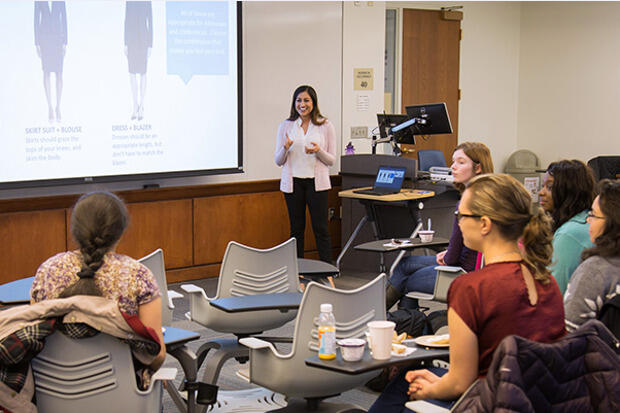
March 28, 2017
VINE program connects women engineering students, helps them thrive
Share this story
Entering the male-dominated field of computer engineering as a first-year student in 2015, Christine Reed found herself relying on other women students who’d been there and done that.
The small cadre of colleagues, all studying the same major, helped her find her own sense of direction. This year, she organized a group that welcomed a new incoming engineering student. Now, she said, “I pass on my own advice. I give my own wisdom.”
Providing continuous support for women students through such networks is the idea behind the new Vertically Integrated Networking for Engineers program at the Virginia Commonwealth University School of Engineering. The program connects students by hosting intimate social gatherings within the same discipline, across years of study. Ideally, each group is made up of a senior, a junior, a sophomore and a first-year student.
Peer-to-peer mentoring is tremendously powerful.
“Peer-to-peer mentoring is tremendously powerful,” said Barbara D. Boyan, Ph.D., dean of the school. “Nothing beats having colleagues solidly in your corner to help you navigate engineering education. The lack of female role models in engineering has left our students without the kind of career mentoring enjoyed by many of our male colleagues. The VINE program provides our students with mentors and gives them the opportunity to learn to mentor others.”
Lorraine M. Parker, Ph.D., director of diversity and student programs at VCU Engineering, launched the initiative as universities across the nation seek to increase women engineering student enrollment.
Nationally, women made up 19.8 percent of engineering students in bachelor degree programs in 2014, according to the National Science Foundation. At the VCU School of Engineering, 25 percent of students are female.
The VINE program is open to women in the following disciplines: computer science, computer engineering, electrical engineering, nuclear engineering and mechanical engineering. The groups are encouraged to meet for coffee once a month — with the school picking up the tab. Help, including suggested discussion prompts and coaching for leading small groups, is available.
The essence of VINE is paying it forward, so each group is asked to take on a project, such as volunteering at a museum or working with a Girl Scout troop.
Roxanne Jassawalla, a junior in the Department of Electrical and Computer Engineering, said the program has helped her, too.
“Dr. Parker is always willing to go the extra mile to ensure women in engineering know that they have a support system here at the school,” she said.
Subscribe for free to the VCU News email newsletter at http://newsletter.news.vcu.edu/ and receive a selection of stories, videos, photos, news clips and event listings in your inbox every Monday and Thursday.
Subscribe to VCU News
Subscribe to VCU News at newsletter.vcu.edu and receive a selection of stories, videos, photos, news clips and event listings in your inbox.













